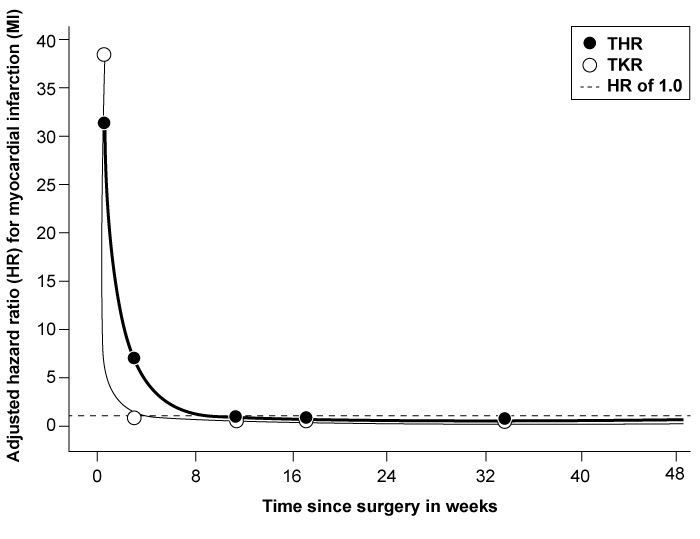A 65-year-old man is scheduled for hip replacement surgery. He is worried about possible complications of the surgery, particularly the risk of heart attack. A retrospective cohort study identified 98,102 patients who underwent total knee replacement (TKR) or total hip replacement (THR) surgery and compared their rates of myocardial infarction (MI) with those of controls matched by age, sex, and geographic region. The following curves for hazard ratios (HR) were obtained.  Based on the study results and assuming statistical significance, which of the following provides the best explanation to the patient?
Based on the study results and assuming statistical significance, which of the following provides the best explanation to the patient?
A) Although there is no risk of heart attack immediately following surgery, the risk increases after hospital discharge.
B) There is an increased risk of heart attack after surgery, which is best explained by risk factors and comorbidities.
C) There is an increased risk of heart attack right after surgery, but it returns to baseline after 4 weeks.
D) There is an increased risk of heart attack up to approximately 8-10 weeks after the surgery.
E) There is no substantial proof that the surgery is associated with a higher risk of heart attack.
Correct Answer:
Verified
Q42: Two independent research groups are studying the
Q43: A 46-year-old woman comes to the office
Q44: A 46-year-old woman comes to the office
Q45: A 26-year-old woman comes to the office
Q46: A large study evaluated a rapid toxin-based
Q48: A 33-year-old woman comes to the clinic
Q49: A retrospective cohort study examines the long-term
Q50: Researchers are interested in further investigating the
Q51: The abstract applies to the next 2
Q52: An epidemiologic study is conducted to evaluate
Unlock this Answer For Free Now!
View this answer and more for free by performing one of the following actions

Scan the QR code to install the App and get 2 free unlocks

Unlock quizzes for free by uploading documents